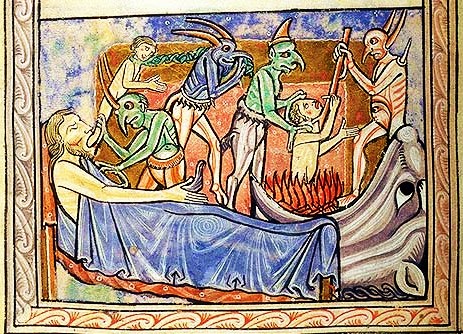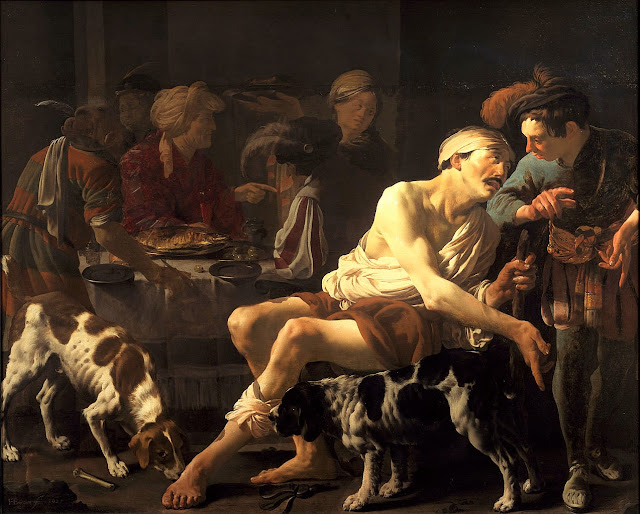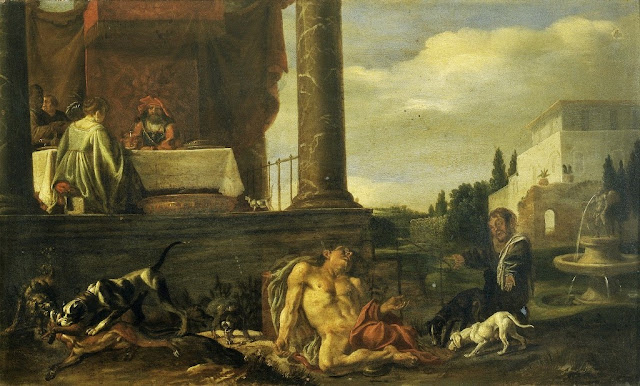"Jesus said to the Pharisees:
"There was a rich man who dressed in purple garments and fine linen
and dined sumptuously each day.
And lying at his door was a poor man named Lazarus, covered with sores,
who would gladly have eaten his fill of the scraps
that fell from the rich man's table.
Dogs even used to come and lick his sores.
When the poor man died,
he was carried away by angels to the bosom of Abraham.
The rich man also died and was buried,
and from the netherworld, where he was in torment,
he raised his eyes and saw Abraham far off
and Lazarus at his side.
And he cried out, 'Father Abraham, have pity on me.
Send Lazarus to dip the tip of his finger in water and cool my tongue,
for I am suffering torment in these flames.'
Abraham replied, 'My child,
remember that you received what was good during your lifetime
while Lazarus likewise received what was bad;
but now he is comforted here, whereas you are tormented.
Moreover, between us and you a great chasm is established
to prevent anyone from crossing
who might wish to go from our side to yours
or from your side to ours.'
He said, 'Then I beg you, father, send him
to my father's house,
for I have five brothers, so that he may warn them,
lest they too come to this place of torment.'
But Abraham replied, 'They have Moses and the prophets.
Let them listen to them.'
He said, 'Oh no, father Abraham,
but if someone from the dead goes to them, they will repent.'
Then Abraham said,
'If they will not listen to Moses and the prophets,
neither will they be persuaded
if someone should rise from the dead.'"
(Luke 16:19-31)Send Lazarus to dip the tip of his finger in water and cool my tongue,
for I am suffering torment in these flames.'
Abraham replied, 'My child,
remember that you received what was good during your lifetime
while Lazarus likewise received what was bad;
but now he is comforted here, whereas you are tormented.
Moreover, between us and you a great chasm is established
to prevent anyone from crossing
who might wish to go from our side to yours
or from your side to ours.'
He said, 'Then I beg you, father, send him
to my father's house,
for I have five brothers, so that he may warn them,
lest they too come to this place of torment.'
But Abraham replied, 'They have Moses and the prophets.
Let them listen to them.'
He said, 'Oh no, father Abraham,
but if someone from the dead goes to them, they will repent.'
Then Abraham said,
'If they will not listen to Moses and the prophets,
neither will they be persuaded
if someone should rise from the dead.'"
The excerpt from Luke that is the Gospel reading for Thursday of the second week of Lent presents the parable of the Rich Man and Lazarus, a pauper who begged at the rich man’s door. (This poor man should not be confused with the other Lazarus, the brother of Mary and Martha, whom Jesus raised from the dead.)
 |
| Lazarus and the Rich Man From a Gospel Lectionary German (Tegernsee), 12th Century Munich, Bayerisches Staatsbibliothek MS Clm 2939, fol. 98r |
In this parable, it seems to me that Jesus, through the Evangelist, is addressing three separate themes: the importance of charity to the poor; the congruence between the life one lives and the reward for that life; and the difficulty which would be faced by those who spread word of Him and His mission.
 |
| The Story of Lazarus and the Rich Man France, c. 1085-1100 Moissac, Abbey of Saint-Pierre, South Portal |
 |
| The Story of Lazarus and the Rich Man, Detail - Lazarus in the Bosom of Abraham France, c. 1085-1100 Moissac, Abbey of Saint-Pierre, South Portal |
In death the rich man and the pauper have outcomes inverse to the lives they lived on earth. The poor man, neglected in life, is welcomed to Abraham’s bosom (an image of heaven) on account of his actions and patience. The rich man, who spent his life in fine clothing and self-indulgence, ignoring poor Lazarus whom he could have helped, finds himself in a place of torment.
His desperate plea for an intervention by Lazarus, aimed at saving his brothers from his own fate, is countered with Abraham’s cynicism, an obvious reference to the reality of Luke’s experience.
'If they will not listen to Moses and the prophets,
neither will they be persuaded
if someone should rise from the dead.'"
neither will they be persuaded
if someone should rise from the dead.'"
Not surprisingly, this parable was a favorite Biblical passage during the Middle Ages, an era in which the worlds of rich and poor were closer together than they are in the contemporary West. It appeared everywhere:
In Sculpture
In Wall Painting
 |
| Lazarus at the Rich Man's Door, The Rich Man at Dinner German, c. 1476-1488 Zierenberg, Protestant Church (painted before the Reformation) |
Perhaps most surprising is its frequent appearance in the prayer books of the very rich and powerful. It was clearly a message for them on how they were expected to live their own lives.
 |
| Jean Colombe and Workshop Deaths of Lazarus and the Rich Man From the Hours of Anne of France French (Bourges), c. 1470-1471 New York, Pierpont Morgan Library MS M 677, fol. 279r |
 |
| Jean Colombe and Workshop Lazarus and the Rich Man From the Hours of Anne of France French (Bourges), c. 1470-1471 New York, Pierpont Morgan Library MS M 677, fol. 277r |
_French%20(Tours),%20c.%201495-1505_New%20York,%20Pierpont%20Morgan%20Library_MS%20H%208,%20fol..jpg) |
| Jean Poyer, Lazarus and the Rich Man From the Hours of Henry VIII (yes, that Henry VIII) French (Tours), c. 1495-1505 New York, Pierpont Morgan Library MS H 8, fol. 134v |
 |
| Master of James IV of Scotland The Rich Man at Table, Lazarus at the Door, Death of Lazarus From the Spinola Hours Flemish, c. 1510-1520 Los Angeles, J. Paul Getty Museum MS Ludwig IX 18, fol. 21v |
 |
| Master of James IV of Scotland, The Rich Man in Torment, Lazarus in Heaven From the Spinola Hours Flemish, c. 1510-1520 Los Angeles, J. Paul Getty Museum MS Ludwig IX 18, fol. 22r |
The images reflected every aspect of the parable. Portrayed were:
The luxury of the rich man
 |
| The Rich Man and Lazarus From the Confessio amantis by John Gower English, c. 1465-1475 New York, Pierpont Morgan Library MS M 126, fol. 141r |
,%20c.%201475-1485_New%20York,%20Pierpont%20Morgan%20Library_MS%20M%20130,%20fol.96r.jpg) |
| The Rich Man at Table, Lazarus at the Door from Book of Hours French (Paris), c. 1475-1485 New York, Pierpont Morgan Library MS M 130, fol.96r |
,%20c.%201475-1480_The%20Hague,%20Meermano%20Museum_MS%20RMMW%2010%20A%2011,%20fol.%2016v.jpg) |
| Master Francois, The Rich Man at Table and Lazarus at the Gate From the City of God, Vol. I by Saint Augustine of Hippo French (Paris), c. 1475-1480 The Hague, Meermano Museum MS RMMW 10 A 11, fol. 16v |
,%20c.%201495-1503_New%20York,%20Pierpont%20Morgan_Ms%20M%20261,%20fol.%2081v.jpg) |
| Robert Boyvin, Lazarus Begging at the Rich Man's Table From a Book of Hours French (Rouen), c. 1495-1503 New York, Pierpont Morgan Library MS M 261, fol. 81v |
,%20c.%201500_Paris,%20BNF_MS%20Latin%20923,%20fol.%2069v.jpeg) |
| Jean Pichore Workshop, The Rich Man at Table, Lazarus Barred at the Door From a Book of Hours French (Paris), c. 1500 Paris, Bibliotheque nationale de France MS Latin 923, fol. 69v |
,%20c.%201510-1520_New%20York,%20Pierpont%20Morgan_MS%20M%20286,%20fol.%2071v.jpg) |
| Follower of Jean Pichore, The Rich Man at Table and Lazarus at the Door From a Book of Hours French (Paris), c. 1510-1520 New York, Pierpont Morgan Library MS M 286, fol. 71v |
 |
| Lazarus Begging at the Door While the Rich Man Dines Inside Dutch, c. 1510 New York, Metropolitan Museum of Art, The Cloisters Collection |
 |
| Lazarus at the House of Dives Flemish, c. 1520 New York, Metropolitan Museum of Art, The Cloisters Collection |
The Miserable State of Lazarus (especially the passage regarding his sores and his relationship with the dogs)
,%20ca.%201190-1200_The%20Hague,%20Koninklijk%20Bibliotheek_MS%20KB%2076%20F%205,%20fol.16r%20(2).jpg) |
| Lazarus at the Rich Man's Door From the Pictorial Bible of the Abbey of St. Bertin French (St. Omer), c. 1190-1200 The Hague, Koninklijk Bibliotheek MS KB 76 F 5, fol. 16r (detail) |
,%2014th%20Century_Paris,%20BNF_MS%20Francais%20152,%20fol.%20413v.jpg) |
| Lazarus at the Rich Man's Door From a Bible historiale by Guiard des Moulins French (Saint-Omer), 14th Century Paris, Bibliotheque nationale de Frane MS Francais 152, fol. 413v |
,%20c.%201475-1500_Paris,%20BNF_MS%20Francais%20178,%20fol.%2067r.jpg) |
| Jean Colombe, Lazarus at the Rich Man's Gate From the Vita Jesu Christi by Ludolph of Saxony French (Bourges), c. 1475-1500 Paris, Bibliotheque nationale de France MS Francais 178, fol. 67r |
Their Respective Deaths
The Fate Which Awaited Each of Them at Death
,%20c.%201425-1450_Paris,%20BNF_MS%20Francais%20376,%20fol.%20113r.jpg) |
| Lazaarus Brought to Abraham in Paradise From Pelerinage de l'ame by Guillaume de Digulleville French (Rennes), c. 1425-1450 Paris, Bibliotheque nationale de France MS Francais 376, fol. 113r |
 |
David Teniers the Younger, The Rich Man Led to Hell Dutch, ca. 1647 London, National Gallery |
The Confrontation Between the Tormented Rich Man and Abraham
,%20ca.%201190-1200_The%20%20Hague,%20Koninklijk%20Bibliotheek_MS%20KB%2076%20F%205,%20f%20(2).jpg) | |
|
 |
| The Rich Man Pleading with Abraham From a Psalter-Hours Flemish, c. 1275-1300 London, British Library MS Harley 2930, fol. 157r |
,%20c.%201350_Paris,%20BNF_MS%20Francais%209561,%20fol.%20156v.jpeg) |
| The Rich Man Pleading with Abraham From Vies de la Vierge de du Christ Italian (Naples), c. 1350 Paris, Bibliotheque national de France MS Francais 9561, fol. 156v |
,%20c.%201371-1372_The%20Hague,%20Meermano_MS%20RMMW%2010%20B%2023,%20fol504v.jpg) |
Jean Bandol and others, The Rich Man Pleading with Abraham From Grande Bible historiale completée by Gerard des Moulins French (Paris), c. 1371-1372 The Hague, Meermano Museum MS RMMW 10 B 23, fol. 504v |
,%20c.%201475-1480_The%20Hague,%20Meermano%20Museum_MS%20RMMW%2010%20A%2011,%20fol.%2016v.jpg) |
| Master Francois, The Rich Man Pleading with Abraham From the City of God, Vol. I by Saint Augustine of Hippo French (Paris), c. 1475-1480 The Hague, Meermano Museum MS RMMW 10 A 11, fol. 16v |
,%20c.%201480-1500_New%20York,%20Pierpont%20Morgan_MS%20M%20179,%20fol.%20132r.jpg) |
| Follower of Master Francois From a Book of Hours French (Paris), c. 1480-1500 New York, Pierpont Morgan Library MS M 179, fol. 132r |
,%20c.%201495-1505_New%20York,%20Pierpont%20Morgan_MS%20M197_089v.jpg) | |
The Rich Man Pleads with Abraham From a Book of Hours French (Paris), c. 1495-1505 New York, Pierpont Morgan Library MS M 197, fol. 89v |
,%20c.%201500-1520_New%20York,%20Pierpont%20Morgan_MS%20M%20431,%20fol.%20115r.jpg) |
| The Rich Man Pleads with Abraham From a Book of Hours French (Rouen), c. 1500-1520 New York, Pierpont Morgan Library MS M 431, fol. 115r |
,%20c.%201500_Paris,%20BNF_MS%20Latin%20923,%20fol.%2070r.jpeg) |
| Jean Pichore Workshop, The Rich Man Pleads with Abraham From a Book of Hours French (Paris), c. 1500 Paris, Bibliotheque nationale de France MS Latin 923, fol. 70r |
 |
| Hans Schaeufelein, The Rich Man in Hell and the Poor Lazarus in Abraham's Lap From Das Plenarium German, 1517 New York, Metropolitan Museum of Art |
 |
| Sebald Beham, The Rich Man in Hell From a Series of New Testament Illustrations German, 1530 London, Trustees of the British Museum |
Later Images
After the Reformation the diversity of these images declined in both Catholic and Protestant countries. The emphasis shifted, to focus totally on the portrayal of the rich man’s luxury. What remained of the rest of the story (that is the reward to each for their lives and the confrontation with Abraham) was shifted to the background or eliminated altogether.
This may be explained, in the Protestant countries at least, by emerging Protestant theology. This proposed that, at death, the soul falls into a kind of sleep, not to be awakened until the Last Judgment. Therefore, the second part of this parable, with its references to an individual judgment shortly after death (for the rich man pleads that a messenger be sent to his still living brothers) may have been uncomfortable.
 |
| Marcus Geeraerts the Elder, Story of Dives and Lazarus Dutch, 1560s Utrecht, Museum Catherijneconvent |
© M. Duffy, 2012, revised and updated 2022
1. Natasha Sheldon, "Feasting the Gods: The Epulum Jovis"
at https://historyandarchaeologyonline.com/feasting-the-gods-the-epulum-jovis/
Excerpts from the Lectionary for Mass for Use in the Dioceses of the United States
of America, second typical edition © 2001, 1998, 1997, 1986,
1970 Confraternity of Christian Doctrine, Inc., Washington, DC. Used with
permission. All rights reserved. No portion of this text may be reproduced by
any means without permission in writing from the copyright owner.
,%20c.%201030_Nuremberg,%20Germanisches%20Nationalmuseum_MS%20Hs%20156142,%20fol.%2078r.jpg)
,%20Glencairn%20Museum.webp)




,%20c.%201487-1490_New%20York,%20Pierpont%20Morgan_MS%20M%20894,%20fol.%2094r.jpg)
,%20c.%201325-50+London,%20British%20Library_MS%20Royal%2019%20C%20II,%20fol.%20100r.jpg)
,%20c.%201425=1450_Baltimore,%20The%20Walters%20Art%20Museum_MS%20W.174,%20fol.%20255r.jpg)
,%20c.%201320-1330_Paris,%20BNF_MS%20FRancais%20187,%20fol.%2017v.jpg)




,%20c.%201300-1310_Baltimore,%20The%20Walters%20Art%20Museum_MS%20W37,%20fol.%2030r.jpg)
.jpg)


_Flemish,%20c.%201521_Brussels,%20Musees%20Royaux%20des%20B-A.jpg)














,%20c.%201295_London,%20British%20Library_MS%20Additional%2054180,%20fol.%20188v.jpg)

No comments:
Post a Comment